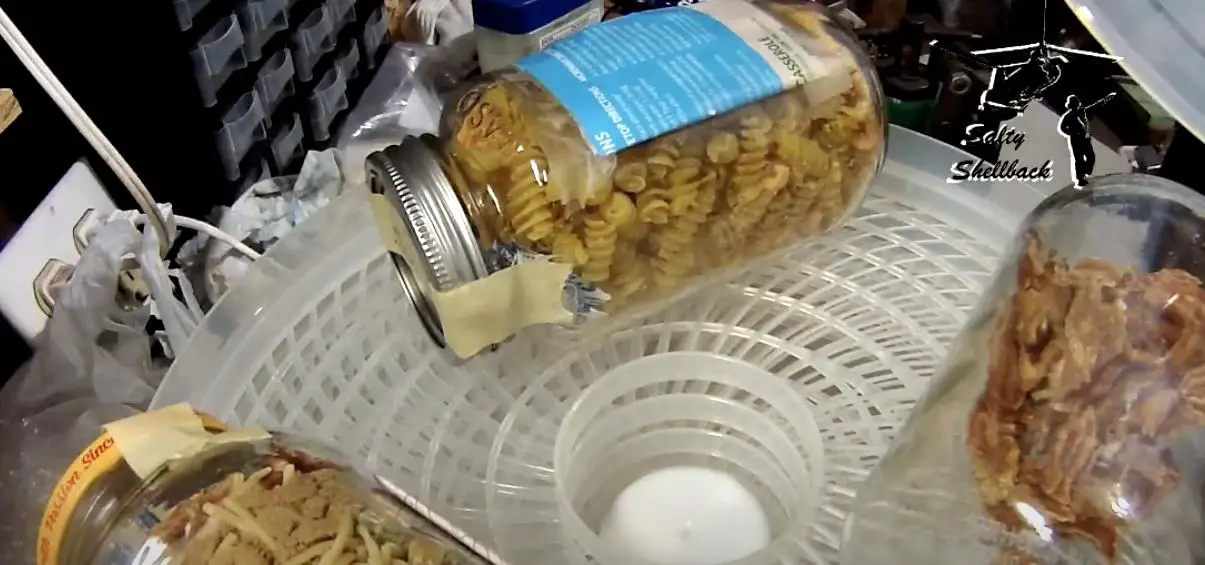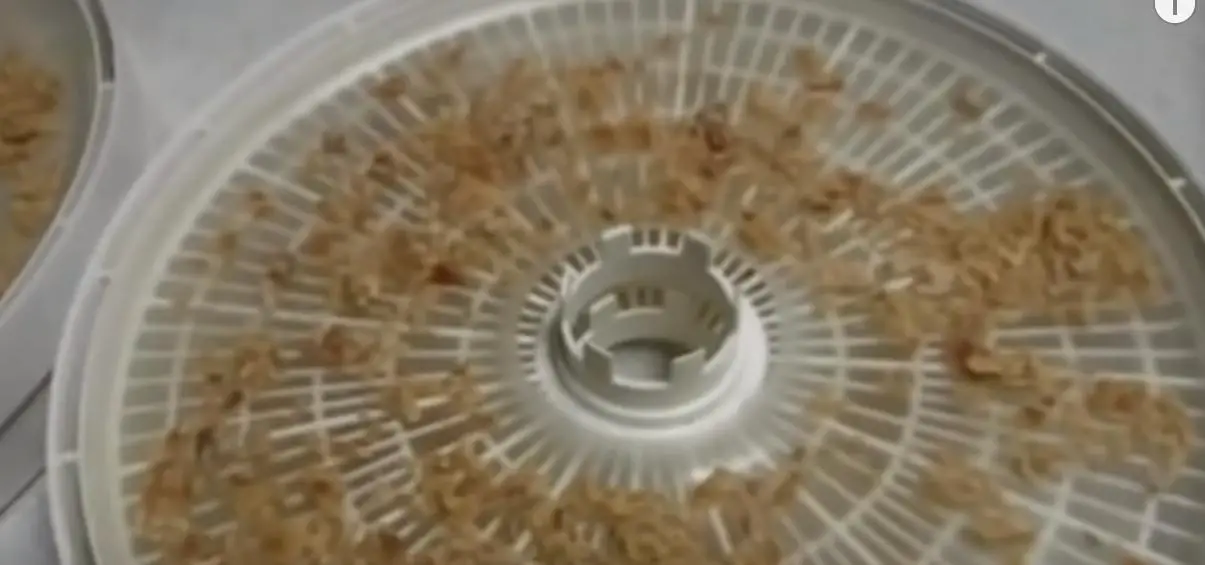Can You Dehydrate Raw Meat? (Things You Should Know)
Key Takeaways
- You can dehydrate raw meat, but it is not recommended
- The dry heat of a warm oven is not likely to kill pathogenic bacteria
Have you ever wondered if you could dehydrate raw meat? If so, then you’re in for a treat!
In this article, we’ll explore the benefits of dehydrating raw meat, how it compares to other methods of preservation, what types of raw meat can be dehydrated, and how long it lasts.
We’ll also provide some tips on the best way to store dehydrated raw meat.
Can you dehydrate raw meat? What are the risks of doing so?
You should not dehydrate raw meat. The temperatures of dehydrators and oven dehydrating are not high enough to destroy harmful microorganisms that are typically present in raw meat. This can cause food poisoning or other serious illness.

How long does it take to dehydrate raw meat?
Dehydrating raw meat is a process that can take anywhere from 4 to 8 hours, depending on the method used. Jerky can be made within 4 to 5 hours using a food dehydrator, 3 to 4 hours in an oven, and 2 hours in a smoker.
The key to successful dehydration is to maintain a consistent temperature of 140 degrees Fahrenheit throughout the process.
How long will dehydrated meat last?
Dehydrating raw meat is a process that can help to preserve it for up to 1-2 months.
When done correctly, dehydrated meat can make an excellent addition to your emergency food supply. Here are some tips on how to dehydrate raw meat properly, so that it will last as long as possible.
First, you’ll need to choose the right type of meat. Lean cuts of beef or pork work best for dehydration, as they have less fat content which can go rancid over time. chicken breasts or thighs are also a good option. Choose fresh meat that has been refrigerated – frozen meat will not dehydrate properly.
Next, trim off any excess fat from the meat and slice it into thin strips no more than ½ inch thick. If the slices are too thick, they will take too long to dehydrate and may not taste as good when reconstituted later on. If you’re using chicken breast, you can cut it into small cubes instead of slicing it into strips.
Now it’s time to start dehydrating! There are several ways you can do this: in a conventional oven set at its lowest temperature setting (usually between 170-200 degrees Fahrenheit), in a food dehydrator designed specifically for dehydration, or even in the sun if conditions are warm and dry enough (just be sure to keep insects away from the exposed meat).
Whichever method you choose, lay the strips or cubes of meat out on a wire rack covered with parchment paper or cheesecloth – this will allow air circulation and prevent sticking/molding.
Depending on how thin your slices are and what temperature you’re drying at, dehydration should take anywhere from 4-24 hours.
What kind of meat can you dehydrate?
You can dehydrate all types of meat, but fresh, lean meats are best. Fat should be avoided as it will spoil quickly. Pork can be dehydrated, but cured ham is the best option. Dehydrated meat has a long shelf life if it is kept in a cool, dry place.
When dehydrating raw meat, you need to take extra care to ensure that it is cooked through properly before consumption. This means that you’ll need to cook the meat at a higher temperature for a longer period of time than you would when preparing it for other methods of consumption such as grilling or frying.
Once the raw meat is cooked through, then you can begin the dehydration process. The first step is to slice the meat thinly so that more surface area is exposed to air which will speed up the drying process.
If you have a food dehydrator, this is the ideal way to go about dehydrating your meat as it will evenly distribute heat and prevent spoiling.
Simply follow the instructions that came with your particular model and load the sliced meats onto the trays making sure not to overcrowd them.
Set your appliance to between 145-155 degrees Fahrenheit and let run until completely dried out which could take anywhere from 4-12 hours depending on how thickly sliced your meats are.
If you don’t have access to a food dehydrator or prefer not to use one, there are still ways you can successfully dehydrate your own meats without one using either an oven or stovetop method though these require more vigilance on your part during both cooking and drying phases since there’s greater potential for uneven results due to inconsistent heat exposure which could lead spoilage if not done carefully enough.
Do you have to pre-cook meat before dehydrating it?
If you’re thinking of dehydrating your own raw meat, you may be wondering if you need to cook it first.
The answer is: it depends. If your oven or dehydrator can’t reach a temperature of 160°F, then cooking the meat beforehand is necessary to kill any harmful bacteria that may be present.
Otherwise, you can simply marinate the meat and then dehydrate it without pre-cooking. Whichever method you choose, make sure that your jerky is properly heated before consuming it to avoid foodborne illness.
Is there a difference in taste between dehydrated cooked and raw meats?
When it comes to taste, there is a difference between dehydrated cooked and raw meats. Dehydration concentrates the flavor of meat and allows for longer storage. Freeze-dried food is nutritionally equivalent to raw food, except for lack of moisture.
Backpackers often refer to dehydrated ground beef as “gravel” because it does not rehydrate well. Jerky is a fully cooked product that has been dried to remove most of the moisture.
So, what exactly does this all mean? Well, simply put – when you dehydrate raw meat, you are essentially removing all the water content from it. This in turn means that all the flavors become more concentrated, giving your dishes a more intense flavor overall.
Additionally, dehydrated meats will last much longer than their fresh counterparts since there is no water present to encourage bacteria growth.
However, it should be noted that while freeze-dried foods are similar nutritionally speaking to raw foods (i.e., they retain most of their vitamins and minerals), they can often be harder to digest due to the lack of moisture present in them.
And finally, if you’ve ever tried backpacking with ground beef that has been dehydrated, chances are good that you weren’t too impressed – this is because unlike other types of meat, ground beef doesn’t tend to rehydrate well after being dried out.
Which method of dehydration is better for raw meats- sun or oven drying?
There is no definitive answer to the question of which method of dehydration is better for raw meats – sun or oven drying. Different people may have different preferences, and there are pros and cons to each method.
Some people may prefer sun drying as it is a more natural method. However, this can take longer and the meat may be exposed to bacteria and other contaminants in the air.
Additionally, the flavor of the meat may be affected by smoke from wildfires or other sources.
Oven drying gives the meat a better flavor, but it requires more energy and time than sun drying.
Additionally, some people believe that oven-dried meat is not as healthy as sun-dried meat because it loses more nutrients in the process.
Ultimately, it is up to the individual to decide which method they prefer based on their own preferences and needs.
How do I know if my raw meat has been properly dehydrated?
Dehydrating raw meat is a great way to preserve it for later use.
However, it’s important to make sure that the meat is properly dehydrated before consuming it.
Here are some tips to help you ensure that your raw meat has been properly dehydrated:
- Use a food thermometer to check the internal temperature of the meat. It should be at least 145F/63C
- Dehydrate the meat for 4-6 hours until it is hard and there are no moisture pockets left
- Store the dehydrated meat in a cool, dry place
Why is it unsafe to consume certain types of dried meats?
There are a few reasons why consuming certain types of dried meats can be unsafe. For one, they may contain Trichinella, Staphylococcus, or mold.
Additionally, processed meat has been linked to various health problems like cancer, heart disease, and diabetes in studies. Finally, cured meat is high in sodium and contains nitrates which could potentially be carcinogenic.
So why is it unsafe to consume certain types of dried meats? Let’s take a closer look.
Trichinella is a parasitic roundworm that can cause trichinosis, which is an infection that results in muscle pain and inflammation. Symptoms also include fever, headache, nausea, and diarrhea. If left untreated, trichinosis can be fatal.
Staphylococcus is a type of bacteria that can cause food poisoning. Symptoms of staphylococcal food poisoning include nausea, vomiting, abdominal cramps, and diarrhea within two to six hours after eating contaminated food. In severe cases, the person may experience dehydration, shock, and even death.
Mold growth on food can cause allergic reactions or respiratory problems if inhaled. It can also produce toxins that could make you sick if ingested. Some mold spores are harmful when inhaled but pose no threat when eaten. However, it’s best to err on the side of caution and avoid consuming any food with visible mold growth.
In addition to these parasites and bacteria, consuming certain types of dried meats may also increase your risk of developing cancer, heart disease, or diabetes.

How can I store my dried meats safely?
When it comes to storing dried meats, there are a few things you need to keep in mind.
First of all, you’ll want to make sure the meat is wrapped tightly in plastic wrap. This will help keep it from drying out and losing its flavor.
You’ll also want to store the meat in a cool place, such as a refrigerator or freezer.
Additionally, you can store dried meats in airtight-lidded containers or vacuum packaging.
Final Verdict
It is not recommended to dehydrate raw meat because pathogenic bacteria are likely to survive the dry heat of a warm oven. This could lead to food poisoning or other serious illness.
If you must dehydrate raw meat, be sure to do so using a food dehydrator that reaches high temperatures (over 165 degrees Fahrenheit) and follow all safety guidelines closely.